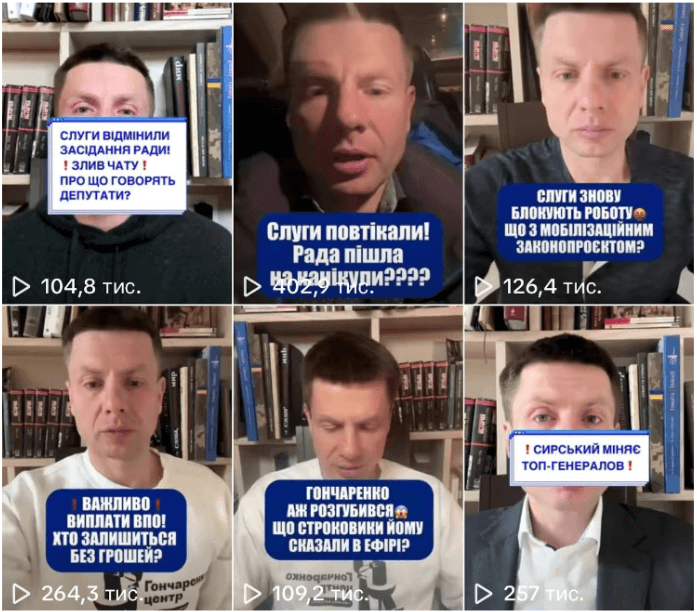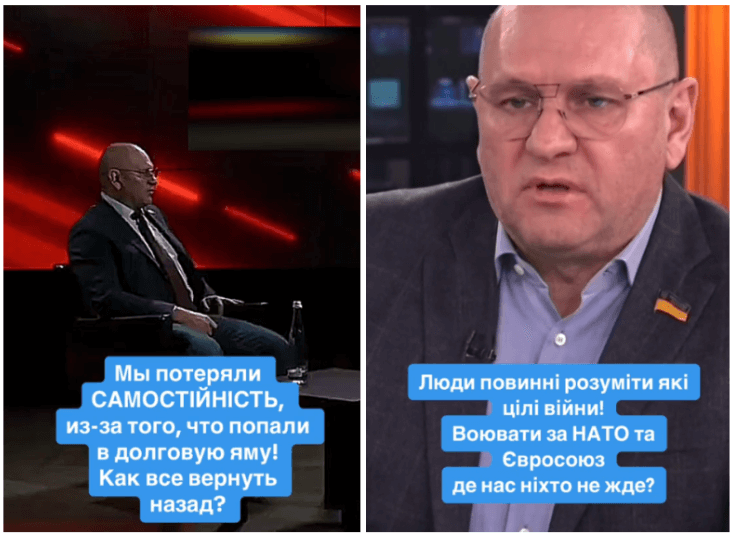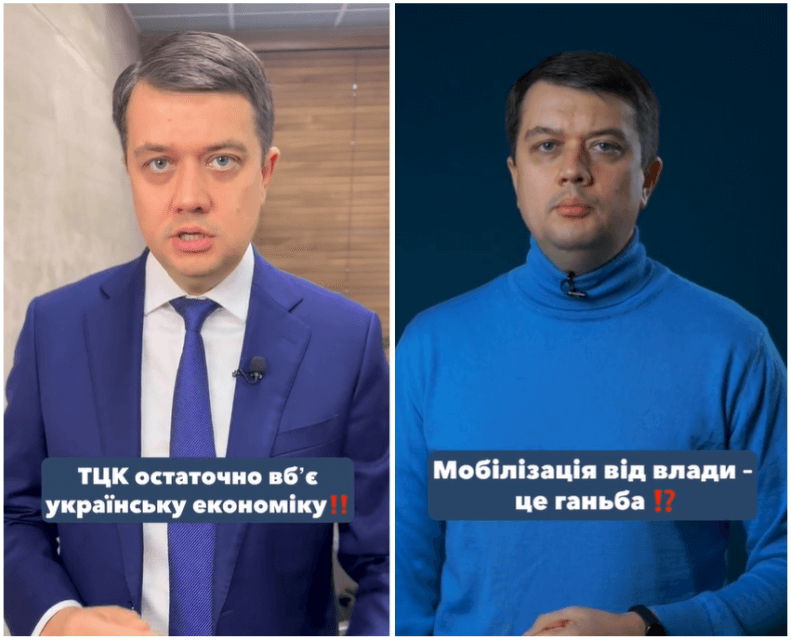The latest Internews research shows that about 76% of Ukrainians use social media to consume news, while only 30% watch it on television. Particularly, in 2023, the share of news consumption from TikTok increased from 1% to 5%. TikTok’s audience consists mostly of young people who are already eligible to vote. They are attracted to short news clips in a format that is understandable and easy for them. Therefore, politicians are migrating to the platform in search of an electorate, as short videos and catchy phrases “for all good and against all bad” can contribute to their support.
Currently, not many members of parliament have accounts on TikTok, and some of them are not very active on the platform. However, there are those who actively strive to win over users’ favor. They “capture” the audience not with the quality but with the quantity of content. These politicians became the subjects of our research. Among the most active current members of the 9th convocation who use TikTok, we singled out Oleksii Honcharenko, Yevhenii Shevchenko, Dmytro Razumkov, Oleh Syniutka, Mykola Kniazhytskyi, and Heorhii Mazurashu. The videos of these deputies published from September 2023 to March 2024 were included in the monitoring.
Most of them discuss current topics that interest society. The top topic among the MPs is the draft law on mobilization, which these same deputies are considering in the Verkhovna Rada. Some politicians also actively promote the topic of negotiations with Russia as a “path to ending the war,” criticize the actions of the current government, mainly Volodymyr Zelenskyi, and discuss the economy of Ukraine.
To increase the number of subscribers, deputies resort to manipulation and playing on people’s emotions. Below, we’ll discuss what MPs are talking about and what methods they use to attract the attention of ordinary Ukrainians on TikTok.
Clickbait
Among the mentioned deputies, MP Oleksii Honcharenko most frequently uses clickbait (short “shocking” headlines with distorted content). Since 2019, Honcharenko has been a member of the parliamentary faction of the “European Solidarity” party.
In most of his videos, Honcharenko adds clickbait captions that grab users’ attention and encourage them to watch the video. However, these headlines are not always constructive and sometimes discredit the actions of the president, representatives of other parties, and instead praise the author of the video. For example, in his posts, the MP adds captions such as “I have bad news! Military! They want to betray you again!“, “Members of Sluha Narodu refused to meet with Zelenskyi! Is there a split? News from Bankova,” “Conscripts together thank Honcharenko for demobilization.”
To attract more attention, the deputy adds emotional expressions to his posts — “urgent,” “important,” “are you mocking?,” “tough,” “shock,” “exclusive on TikTok,” “send this to everyone.”
Additionally, the deputy publishes videos with headlines where he speaks about himself in the third person — “Honcharenko is furious,” “Honcharenko is outraged,” “Honcharenko is speechless,” and so on. All these emotional and clickbait captions of the MP encourage users to watch his videos. Typically, such videos on Honcharenko’s page garner more views, however, similar headlines may sow hostile sentiments among Ukrainians and evoke distrust towards the state.
Screenshot of Oleksii Honcharenko’s page on TikTok
Another deputy who uses clickbait in his TikTok videos is Yevhenii Shevchenko. From 2019 to 2021, Shevchenko was a member of the “Servant of the People (Sluha Narodu)” party. After Shevchenko was expelled from the “Servant of the People” party due to his support for the self-proclaimed president of Belarus, he joined the parliamentary group “Restoration of Ukraine,” which includes former members of the banned in Ukraine party “Opposition Platform — For Life”.
While Oleksii Honcharenko mostly tries to arouse interest in his own videos with his headlines, Shevchenko’s TikToks mainly play into Kremlin narratives and aim to discredit Ukraine. His videos feature captions such as “We lost our independence because we fell into a debt trap! How to turn everything back?”, “Diia — a digital concentration camp for Ukrainians!“, “People should understand the goals of the war! Fighting for NATO and the EU where nobody waits for us?“.
Another MP, Dmytro Razumkov, successfully ran for office in 2019 from the “Servant of the People” party and served as its chairman until November 10, 2019. From August 2019 to October 2021, he held the position of Chairman of the Verkhovna Rada of Ukraine, later he created the inter-factional parliamentary association “Smart Policy (Rozumna Polityka)” in parliament. Afterward, critical remarks towards Volodymyr Zelenskiy and the “Servant of the People” party became more frequent. However, not all accusations are based on facts, sometimes outright speculation is employed.
For instance, he uses clickbait headlines in his videos, such as “Territorial Centers of Recruitment and Social Support will finally kill the economy,” “Mobilization by the authorities is disgraceful.” These captions not only increase the number of views but also turn the audience against the military. Even without watching the video, they shape a negative attitude towards mobilization and Territorial Centers of Recruitment and Social Support.
Screenshots of videos from Dmytro Razumkov’s page on TikTok
Manipulations
The aforementioned Yevhenii Shevchenko also resorts to manipulations. In a video about the new draft law regarding mobilization, he says: “If you haven’t registered with the military enlistment office, haven’t received a military ID or a mark on it, they can simply take you away for 15 days. Because through ‘Diia’ you were properly informed that you must report. This is an electronic summons. And I’ll honestly say that I don’t accept ‘Diia’.”
The draft law indeed states that in case of non-compliance with military obligations by conscripts or reservists, the National Police can detain them for up to 15 days and deliver them to the Territorial Center of Recruitment and Social Support. If the police are unable to do so, then the head of the Territorial Center of Recruitment and Social Support must send a letter within 5 days demanding compliance with their duty. Notifications can be sent by regular mail or electronically if the citizen is registered in the conscript’s electronic cabinet. However, there is no mention of “Diia” in the draft law. The Ministry of Digital Transformation has repeatedly emphasized that there will be no electronic summons or a conscript’s cabinet in “Diia”. The electronic cabinet for conscripts, draftees, and reservists is being developed by the Ministry of Defense based on a separate registry called “Oberih”.
MP Heorhii Mazurashu, who was elected in 2019 from the “Servant of the People” party, also has a TikTok account. In 2024, he left the party, although he still remains in the parliamentary faction. Mazurashu is not far behind Shevchenko and publishes a part from an interview where he suggests that the ban on men leaving the country is harmful to the state. Therefore, he proposes to open the borders, arguing that “not everyone will leave” because there are not enough job opportunities in Europe.
In turn, the journalist asked what the demographic situation in Ukraine would be if men left the country to join their families, who were also forced to leave after February 24, 2022. The deputy avoided answering and stated that separation destroys Ukrainian families, and if Ukrainians are not pressured, they will do much more. Such rhetoric seems strange, as while Ukraine is at war with Russia, whose population exceeds Ukraine’s several times over, a Ukrainian MP suggests depriving the Defense Forces of a certain reserve.
It’s not just about the negative consequences for the defense capabilities of the state in the event of men of conscription age leaving, but also about the damage to the economy. And Mazurashu understands this very well, as he says in another video: “It’s no secret that our partners do not provide funds for maintaining the army, for the army, they provide us with social benefits. We maintain the army from our own revenues in the state budget.” So it’s obvious that the mass departure of men will lead to a decrease in tax revenues to the budget and, as a result, reduce funding for the Armed Forces.
Moreover, the ban on leaving the country is not total; the legislation specifies categories of citizens who can freely cross the border during martial law. In particular, men who have a wife, parents, or parents of their wife among persons with disabilities can leave; parents, guardians, adoptive parents who raise a child with disabilities, parents of many children, and so on.
Furthermore, Mazurashu posted a video on TikTok where he comments for the pro-Russian YouTube channel “Vyshka.” The project is owned by former MP and state traitor Yevhen Muraiev, and most of the speakers have pro-Russian views. Some of them, including Dmytro Korniichuk, have been announced suspects by the Security Service of Ukraine in justifying Russian aggression.
Read more details about the anti-Ukrainian narratives spread on the “Vyshka” broadcasts here.
Populism
In addition to manipulative messages, deputies on their TikTok pages also spread populist statements that encourage viewers to support the author. For example, Mazurashu in a video talks about a case where law enforcement prevented men of the conscription age from leaving the country. The politician claims that such actions are wrong on the part of the state. Instead, he argues that “everything possible” should be done to make citizens willing to defend Ukraine rather than issuing summons and banning travel abroad. However, in the video, he does not specify whether those men had legitimate reasons to travel abroad and does not explain what exactly “everything” means and what specific steps the government should take. Therefore, Mazurashu’s statement sounds unsubstantiated and populist.
Oleh Syniutka also offers simple solutions to complex issues. He explains that corruption harms Ukraine, so it is necessary to fight against this phenomenon. He points out that one should not care about the positions of corrupt officials. “Anyone who cannot explain their wealth today must be held accountable, anyone who steals must be held accountable. Anyone who engages in illegal activities must be held accountable publicly, categorically,” says the deputy. It’s a very “innovative” solution, yet again without any specifics.
In another video, Syniutka also reiterates that responsibility for corrupt individuals should be “harsh” and “swift.” He points out that the anti-corruption vertical has already been established — the National Agency for the Prevention of Corruption and the High Anti-Corruption Court should handle corruption cases. “Today, we just need to enforce the law. We need to rid the anti-corruption law enforcement agencies of the corrupt themselves,” advises the deputy. In this video, the path to solving the problem seems apparent and superficial: to fight corruption, corrupt individuals must be punished. It’s a simple formula, but Syniutka doesn’t delve into nuances or provide practical advice. The deputy does not specify who exactly within the anti-corruption agencies has been implicated in corruption, how to address existing gaps in the system, and what needs to be done to make the anti-corruption agencies more effective.
“Insider information” and forecasts
Also, in their videos, deputies provide “insider information” and make various forecasts. For example, Yevhenii Shevchenko claims in his video that the war in Ukraine will end in January-February 2025, allegedly coinciding with Trump’s inauguration.
In another video, Shevchenko “analyzes” what might happen in Ukraine if the West stops military aid to Ukraine and a confrontation between Joe Biden and Donald Trump begins. According to his forecast, once Russia senses the “weakness” of the USA, it will not only advance on the East, South, and West but will also launch a preemptive tactical nuclear strike on Lviv. Then, according to the deputy’s words, Ukraine will allegedly face a scenario similar to Japan, which resisted in World War II and was hit by a nuclear bomb dropped by the USA. With such statements, Shevchenko also tries to sow panic among Ukrainians. This is clear manipulation because Shevchenko compares Ukraine, a victim of Russian aggression, to Japan, which conducted military expansion in the Pacific Ocean during World War II.
Heorhii Mazurashu posted a part from an interview with a military officer on his TikTok, who predicts that the Russian-Ukrainian war cannot be won by battles and therefore, “negotiations are needed”. That is, to engage in talks with Russia. However, such statements are manipulative because Ukraine had already engaged in negotiations with Russia at the beginning of the large-scale invasion. These negotiations were not successful because Russia offered unacceptable conditions for Ukraine — to abandon the deoccupation of territories, recognize the “independence” of the temporarily occupied territories of Donetsk and Luhansk regions, become a neutral country, and limit the army, which essentially would mean capitulation. Moreover, Russia systematically violates international agreements and does not adhere to agreed rules, as was the case with the disruption of the “grain deal.” Therefore, any negotiations and agreements with Russia would actually give it the opportunity to rest and start a new offensive on Ukrainian cities.
Fakes
The Member of Parliament from the “European Solidarity” party, Mykola Kniazhytskyi, resorts to spreading false information on his TikTok account. Specifically, commenting on the blockade of the border with Ukraine by Polish farmers, he claims: “The Ukrainian authorities, through their passivity, were practically losing any chance to resolve the conflict. Because the conflict should have been resolved immediately once it started.” Further in the video, there are flashes of youth about how Ukraine supposedly isn’t interested and isn’t doing anything to unblock the border with Poland.
However, this is not true; the deputy remains silent about the repeated attempts by the Ukrainian authorities to resolve the issue of Ukrainian grain exports through Polish territory as early as April 2023. Ukraine promised to refrain from exporting wheat, corn, rapeseed, and sunflower to Poland until the new season. However, this did not help, and on April 16, Poland banned the import and transit of not only grain but also other agricultural products from Ukraine — vegetables, dairy products, honey, oil, eggs, and wine. In the same month, as a result of further negotiations, Poland and Ukraine agreed to permit the transit of grain and other agricultural products.
In September, the issue was also discussed at the level of the presidents of Poland and Ukraine, and a plan to unblock the border was presented. Ukraine proposed introducing a mechanism for joint verification and coordination of the supply of four types of goods, including wheat, corn, rapeseed, and sunflower seeds, to Poland, Romania, Hungary, Slovakia, and Bulgaria. However, the Minister of Agriculture of Poland emphasized that Poland would like Ukraine to withdraw its complaint to the World Trade Organization regarding restrictions on the export of its agricultural products. In turn, the Ukrainian government stated that it could withdraw the lawsuit if Poland, Hungary, and Slovakia guarantee that restrictive measures will not be applied to Ukrainian goods in the future. However, the Polish side indicated that it does not intend to lift the ban on Ukrainian agricultural products, even if Ukraine withdraws its complaint.
In February 2024, the government presented a new plan. According to it, Ukraine agreed to the restrictions proposed by the European Commission regarding agricultural exports. Specifically, Ukraine agreed to export poultry meat, eggs, and sugar to Poland without quotas and duties in volumes no greater than the average in 2022 and 2023. The Ukrainian side proposed to address the European Commission with a request for an urgent analysis of the quality of Ukrainian grain. It was also proposed that Ukraine and Poland jointly appeal to the European Commission to stop Russian agricultural exports to the EU. In response, Prime Minister Donald Tusk stated that the governments of both countries should meet on March 28 to discuss the plan.
Oleh Syniutka, a party member of the same party as Kniazhytskyi, also makes false statements. In one of his videos, he claims that it is unclear where the funds allocated for the “Army of Drones” project were spent. “A year ago, the Verkhovna Rada allocated 40 billion for the Ukrainian military to receive drones necessary on the front lines. Deputy Prime Minister of Ukraine Mykhailo Fedorov took charge of this matter. What do we have today: there is no report for 40 billion, there are no 200,000 drones promised to the Ukrainian military,” the politician says. Similar claims were made by Dmytro Razumkov, stating that there is no “Army of Drones” from the government and that UAVs are purchased exclusively by volunteers or the military themselves.
Military personnel, volunteers, and journalists often point out the lack of drones in the Ukrainian Armed Forces and the insufficiently effective work of the government, which sometimes even slows down the production of UAVs. At the same time, it would be incorrect to say that the state “does nothing” — on the contrary, initiatives are being developed to address this situation.
In particular, the “Army of Drones” project was launched for this purpose. Within its framework, the plan was indeed to produce or procure 200,000 drones by the end of 2023. In December 2023, Mykhailo Fedorov announced that over the year, contracts were signed for more than 300,000 UAVs, 90% of which are domestically produced drones. Most of them are expected to be delivered to the military in 2024. He also noted that in Ukraine, 300 engineers and 200 private companies are engaged in UAV production.
In addition, progress in drone production was noted by the Minister for Strategic Industries, Oleksandr Kamyshin. He reported that thanks to allocated funds, in December 2023 alone, Ukraine produced over 50,000 FPV drones and significantly increased their procurement volumes. He also indicated that in 2024, Ukrainian companies are capable of producing over 1 million FPV drones, more than 10,000 medium-range strike drones, and over a thousand long-range strike drones.
From June 2023 to January 2024, strike units of UAVs within the “Drone Army” framework hit over 14,000 enemy targets. Minister of Digital Transformation Fedorov publishes weekly results of the strike UAVs’ work on his Telegram channel. For example, from March 4 to March 18, 2024, the Ukrainian Armed Forces destroyed or damaged with drones 88 tanks, 174 combat armored vehicles, 180 trucks, and 133 artillery pieces.
Deputies also discuss President Zelenskyi’s powers during martial law. In one of the videos, Razumkov claims that in the spring of 2024, the president will lose legitimacy because his term will end. He added that the Chairman of the Verkhovna Rada should then assume the duties of the president. “We are not talking about the martial law bill now, we are talking about the Constitution. The Constitution clearly states that the powers of the Verkhovna Rada continue until the end of martial law and until the new Verkhovna Rada takes the oath. There is no such provision for the president,” he says.
First, Razumkov incorrectly uses the term because “legitimacy” is the support and recognition of the authority of the government by the country’s population. According to the Kyiv International Institute of Sociology data as of February 2024, 64% of respondents trust the incumbent president. According to another KIIS survey in February 2024, 69% of citizens believe that Zelenskyi should remain in office until the end of the state of war. So, the president still enjoys support, although his rating has dropped compared to previous years. Instead, in the video, Razumkov likely refers to legality, meaning the legality of Zelenskyi’s tenure as president.
Second, in 2024, presidential elections were indeed scheduled to take place, but holding elections during martial law is prohibited by Article 19 of the “Law on the Legal Regime of Martial Law.” Therefore, during the state of war, the President of Ukraine will remain in office on legal grounds, and the next elections will be held after the martial law is lifted. In November 2023, the leadership of the Verkhovna Rada and representatives of parliamentary factions, including the opposition, signed a memorandum on holding the next presidential and parliamentary elections no earlier than 6 months after the end of the state of war. Why Razumkov suggests not paying attention to the law but only mentioning the Constitution is unclear. After all, this law is in force and cannot be ignored.
Regarding the transfer of power to the Speaker of the Parliament, the head of parliament can only perform the duties of the president until the election of a new head in the event of early termination of the president’s powers due to resignation, incapacity to work due to health reasons, impeachment, or death. However, in other cases, the president cannot delegate their powers to other individuals or bodies until the newly elected president takes office.
Conclusion
So, some politicians actively use TikTok to promote themselves and their political party. Short and laconic videos attract users because they don’t need to delve deeply into the issue — the politician will do it for them. And having a recognizable face or a well-known political party name adds more legitimacy to their words. For the politicians themselves, it’s also the easiest way to promote their agenda on TikTok, as it doesn’t take much time and doesn’t require significant financial investments. This activity is not illegal. However, it’s worth remembering that, like any bloggers or influencers, they can make mistakes, manipulate, or intentionally spread false news. To avoid falling into this trap, it’s worth asking yourself what motivation the video author is driven by and verifying the information they provide.
There are several signs that will help you understand if someone is trying to manipulate you. The first one is clickbait headlines or images that evoke overly positive or negative emotions. They signal that the information may be manipulative or fake. It’s also important to pay attention to the source referenced by the politician. If it’s absent and the information is presented as “insider” news, it’s likely just the opinion of one MP who doesn’t fully disclose the entire topic.
In addition, it’s worth briefly familiarizing yourself with the speaker’s biography, as this will help better understand why they express a particular opinion. In the case of a lawmaker, you can verify whether their words align with the draft laws they propose or vote for. This can be done on the website of the Verkhovna Rada using the document number that was considered.
To find out how effectively a MP works and which laws they support, you can read articles in the Reform Index on the Vox Ukraine website and in the section “MP Efficiency: How Deputies Support Reforms.”
Attention
The authors do not work for, consult to, own shares in or receive funding from any company or organization that would benefit from this article, and have no relevant affiliations





